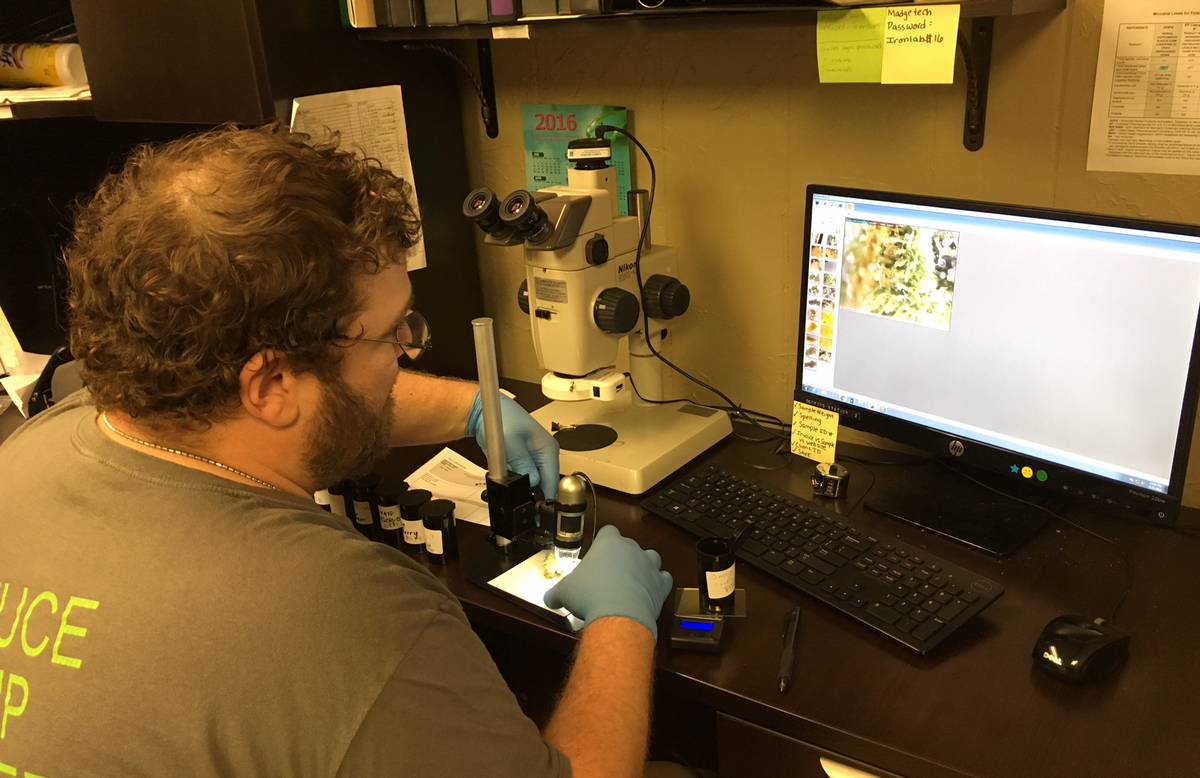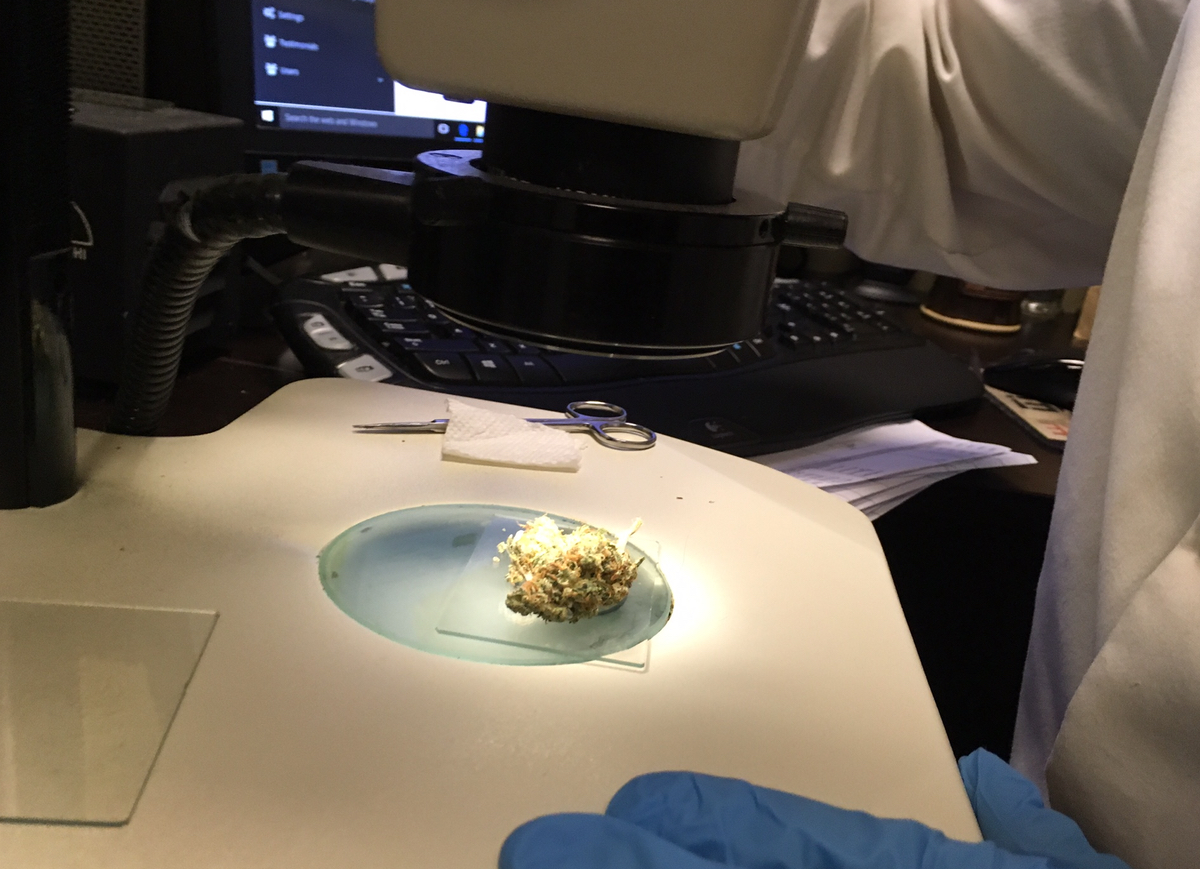A budding market for risk-taking pot entrepreneurs
Inside a small, suburban industrial building in Walled Lake, northwest of Detroit, scientists in white lab coats look at marijuana under microscopes, noting every instance of mold or mites before sending the samples to be tested for potency and quality.
For five years, Iron Laboratories LLC has been filling a niche in Michigan’s medical marijuana industry: Testing products for impurities and ensuring that the level of THC, the active chemical in marijuana, matches what is advertised, even though Michigan doesn’t require such testing.
That’s about to change. By December 2017, new licensing regulations will make safety testing mandatory, which is likely to ramp up competition. Gov. Rick Snyder’s administration is expected to hire a vendor to run a statewide marijuana tracking system. And the regulations will add certainty for companies that have been operating in legal gray areas.
More coverage: Michigan could gain millions in tax revenue in legal marijuana market
“I’m in a good position. I can show the state three years’ worth of test results (to say): ‘I deserve a license,’” said Howard Lutz, Iron Laboratories’ CEO.
The gradual march in the U.S. toward legalization of marijuana represents a new opportunity for entrepreneurs like Lutz looking to start companies in a market that could top $7 billion this year, according to some national estimates. A new layer of business is forming in Michigan and across the country to support the growers and dispensaries long thought of as its central players. Tech firms, science labs, business consultants and attorneys are opening their doors to the industry — medicinal or recreational, depending on the state — without, in some cases, ever handling the drug.
Michigan is one of 25 states, along with Washington, D.C., and the U.S. territories of Puerto Rico and Guam, to decriminalize marijuana use for medical reasons, according to the National Conference of State Legislatures. California was the first state to allow medicinal uses of the drug through a voter-approved initiative in 1996.
Voters in just four states — Colorado, Washington, Oregon and Alaska — and Washington, D.C., have legalized recreational use of small amounts of marijuana for adults. The issue will be on the ballot in at least five states next month, including Arizona, California, Maine, Massachusetts and Nevada.
Still, eventual legalization in Michigan is not guaranteed. Though the issue has made it onto the ballot in at least five states next month — though not in Michigan — cannabis entrepreneurship remains a high-risk, high-reward gamble that public opinion will continue to move toward legalization. And while sentiment seems to be shifting, operating during a time of transition is complex.
Several states said they want to professionalize an industry that otherwise would be underground. People with experience in software development and biochemistry who could work in any number of fields are choosing to work in cannabis, despite difficulty in securing financing from traditional lenders and the risk inherent in operating on the edge of legality.
Companies like Iron Laboratories say their forays into the industry are in anticipation of stricter state regulation and, eventually, full legalization, which they consider the next wave of social change — one they hope to capitalize on.
“I’m not some flag-waving, free-the-weed marijuana proponent,” said Lutz, who co-founded the company in 2011 after an earlier career in his family’s newspaper distribution business. “I think that there’s legitimacy in what we do, and I think there’s legitimate opportunities here.”
Some law firms are creating cannabis practice areas to advise their industry clients on such issues as intellectual property related to branding and labeling, tax law, business formation and zoning rules. Lawyers also help navigate the fuzzy line between federal prohibition and state decriminalization.
For instance, said Doug Mains, a Lansing-based attorney in Dykema Gossett PLLC’s cannabis group, can a company get a trademark on a logo that uses an image of a marijuana leaf? How does an attorney advise a client on compliance with state law when that same attorney knows the advice also violates federal law?
The U.S. Department of Justice in 2014 issued guidance meant to deter some prosecution under the federal Controlled Substances Act — which bans marijuana on the basis that it has “no currently accepted medical use” — in states that have decriminalized use, but the Obama administration has stopped short of relaxing its classification of marijuana as an illegal drug with no acceptable medical use.
Marijuana businesses need the same types of legal services as non-cannabis companies, Mains said, but the legal dichotomy means “everything’s a little bit more complicated.”
Business opportunities
Overall, changing attitudes toward marijuana are opening up new business opportunities for entrepreneurs, said Lutz, whose family company, Lutz News Co., distributed publications, including Crain’s, to newsstands in Southeast Michigan until it closed in 2008.
“There’s a lot of people poised, there’s a lot of people eager to do it,” he said. “There’s a lot of people who are sinking a lot of investment in the notion that the investment itself will be a good one.”
Michigan is home to several startup marijuana businesses, including other testing labs. PSI Labs opened at the end of 2014 near Ann Arbor, in Washtenaw County’s Scio Township, where it tests marijuana products for impurities, quality control and potency. Ben Rosman, 34, an attorney and co-founder, said he and his business partner, Lev Spivak-Birndorf, also offer consultation services to help growers, producers and dispensary owners manage such things as mold and proper dosing in edible products.
The lab employs seven people, most of whom have backgrounds in science fields, and counts hundreds of clients across the state, Rosman said. It offers a web portal to help marijuana growers and producers, as well as registered medical marijuana patients, find lab-tested products in Michigan.
Rosman declined to disclose current sales figures or the amount of startup funding needed to get PSI Labs operating. He said he and Spivak-Birndorf presented a lengthy business proposal, mostly to family and friends, and many opted to invest in the company.
He said he intends for PSI Labs to bring transparency to the industry, though he noted the lack of licensing requirements has created a unique situation for marijuana-related businesses.
“We’re doing everything by the book, except we wrote the book,” Rosman said. “We’re trying to set the bar very high.”
Steadfast LLC opened in November 2015 in Hazel Park after its owners spent about two years in research and development, said a company leader, who requested his name not be published because the lab is not yet his full-time job. The lab, which tests marijuana products for such impurities as mold and mildew and for chemical potency, employs three people and counts about 70 clients to date.
Sales are in the “tens of thousands,” he said, noting that Steadfast is a smaller player in a growing market with competitors that have five to 10 times the market share. Advertising so far has mostly been word of mouth.
And in Lansing, ACT Laboratories Inc. has been open about five years; it has seven employees between Lansing and a location in Illinois and about 250 clients, according to the business.
Lutz and a group of partners started Iron Laboratories in 2011 with roughly $50,000 to $75,000 in upfront costs, he said. Iron Laboratories has tested 80,000 samples in its first five years, Lutz said, and counts close to 2,000 registered clients in Michigan. All clients must be Michigan medical marijuana cardholders.
“We’ve quadrupled our capacity from the early days, when we used to do, say, 20 samples a week,” he said.
“We can do 200 a night if we have to now.”
The lab tests marijuana samples from dispensaries and growers across the state, Lutz said. All products go through biological and chemical testing. Its scientists have bachelor’s and advanced degrees in such fields as molecular biology, pharmacology and biochemistry.
Lutz declined to disclose specific sales figures, but said business doubled every year for its first three years from a base of about $125,000 in 2012. Sales were up 25 percent in 2015 and are flat to date this year, though Lutz said at least half of the lab’s sales come in the final quarter of the calendar year.
That growth has led Iron Laboratories to open a second office in Eugene, Ore. Lutz said he is looking at ways to expand in other states, including California and Nevada, but said expansion has to be organic and sustainable.
“We run everything ourselves, and that doesn’t mean that we’re not open to investment, because we are,” Lutz said. “But we’re open to investors that can come to our table and listen to what it’s taken for us to sustain the business to the point where we are now.”
Tiered licensing
Snyder recently signed legislation that will create a tiered licensing system for marijuana businesses: Growers; processors, or those who make edible or other products infused with marijuana; provisioning centers, another term for dispensaries; secure transporters, who are paid to store and transport marijuana between locations; and safety compliance facilities, or businesses that test marijuana, all will need to be licensed to operate.
Safety compliance facilities, like Iron Laboratories, would need to be accredited by a state-approved entity within a year after receiving a license. They will be required to submit records of transactions and inventory into a statewide database that tracks marijuana products, have a secure lab that can’t be accessed by the public and employ at least one person with an advanced degree in a medical or laboratory science.
“Not only does this create transparency and legitimacy, this creates a fair playing field for everyone who wants to be a part of the business end of marijuana,” said Willie Rochon, vice president of the Michigan Cannabis Development Association, which advocated for the state regulations in the Legislature and represents about 20 members within the industry, including dispensaries.
In order for a company to receive a license, a new medical marijuana licensing board within the Michigan Department of Licensing and Regulatory Affairs will review information about any officers, directors, shareholders or partners; their criminal histories; and projected or actual sales revenue, among other things.
LARA said it is beginning to create the licensing framework, and applications won’t be accepted until December 2017.
“One of the reasons you have seen many proponents of either marijuana policy reform or even players in this emerging industry argue for things like regulation and government oversight is because they don’t want to be painted in the same brush as those who are engaging in bad practices,” said Paul Armentano, deputy director of the National Organization for the Reform of Marijuana Laws, or NORML, a Washington, D.C.-based advocacy group that advocates legalization of recreational marijuana for adults. “The only way that happens is when you have regulatory oversight and the regulations are clear and transparent for everyone involved.”
If Michigan wants to support the marijuana industry, Armentano said, the state should design its regulatory system to grant many licenses if applicants meet qualifications, and avoid writing the rules in such a way as to limit the number of providers.
Michigan also should make sure it budgets for enforcement, Armentano said. Without it, “they’re largely toothless,” he said. “This is the final piece of this puzzle that Michigan needs to get right.”
Risk for financial institutions
One piece that remains in flux also has to do with money.
On Valentine’s Day 2014, the federal government issued a pair of memos offering guidance to financial institutions regarding marijuana-related businesses.
The Justice Department earlier had instructed federal prosecutors to examine marijuana crimes through the lens of eight specific priorities, including keeping the drug out of the hands of minors and drug gangs and preventing it from being transferred across state lines to states in which it is banned. Yet banks and financial institutions could be prosecuted for conducting transactions for marijuana operations through federal money laundering statutes and the Bank Secrecy Act.
What the newer guidelines suggest is that it “may not be appropriate” to go after financial institutions that serve marijuana-related businesses that don’t violate prosecutors’ eight marijuana focus areas, so long as they aren’t knowingly averting their eyes to illegal activity. Financial institutions that don’t comply with states’ regulatory structures or do business in states without one could face more risk, the memo said.
The Financial Crimes Enforcement Network, within the U.S. Department of the Treasury, encouraged banks to review their own business goals and conduct a risk assessment and thorough due diligence, such as verifying a business’ state operating license, before deciding whether to work with marijuana-related businesses.
Yet the advice didn’t assuage banks’ fears. The American Bankers Association, in a memo on its website, said the guidelines could send mixed signals to the industry because marijuana’s illegal status hasn’t changed. That has been enough for some banks to turn down all cannabis business.
“They still had quite a chilling effect, because why would these financial institutions be complicit in violation of federal law?” said Thomas Howard, a Peoria, Ill.-based attorney with Howard & Howard, a law firm that also has offices in Royal Oak and Ann Arbor. “It gets back to the conundrum: Is it illegal? Yes and no. That’s the problem — there’s no clear answer.”
As a result, many marijuana business owners find it difficult to secure financing through traditional lenders. That means putting up some of their own money, borrowing from friends or family or tapping into hedge funds, Howard said.
Kyle Sherman said he raised $500,000 in a seed funding round to start Flowhub, a Denver-based tech firm that creates a point-of-sale system for marijuana dispensaries and automates the data collection and reporting required under some states’ “seed-to-sale” tracking requirements.
Some of that early-stage funding came from Poseidon Asset Management LLC, a San Francisco-based hedge fund that deals exclusively with cannabis companies, along with angel investors, friends and family members, said Sherman, 29, the company’s CEO.
He declined to disclose details about additional fundraising or revenue. Sales are doubling every month, he
said.
“When you only have a limited pool of people putting money in, that makes things difficult,” Sherman said. “Until we have some sort of federal legalization or more federal clarity on where they stand, I think it will continue to be difficult for people to raise money.”
Flowhub charges a monthly fee for the software, which starts at about $450, Sherman said. The company employs at least 20 people in such roles as engineers, software developers and sales, and regularly receives emails from people wanting to work there.
“This is a great way to do it without touching the plant,” he said.
The company is not yet in Michigan, but plans to enter the state once its compliance rules are written, Sherman said.
The potential for an influx of new entrepreneurs as soon as next year has Iron Laboratories paying attention.
“Everyone’s going to have to step up their game, including the laboratories,” said Robert Teitel, its president. “We know that people will be coming after us.”
See what new members are saying about why they donated to Bridge Michigan:
- “In order for this information to be accurate and unbiased it must be underwritten by its readers, not by special interests.” - Larry S.
- “Not many other media sources report on the topics Bridge does.” - Susan B.
- “Your journalism is outstanding and rare these days.” - Mark S.
If you want to ensure the future of nonpartisan, nonprofit Michigan journalism, please become a member today. You, too, will be asked why you donated and maybe we'll feature your quote next time!


 This scanner, developed by Flowhub, automates the data collection and reporting required of marijuana dispensaries by some states. Michigan is becoming a magnet for cannabis entrepreneurs. (Courtesy Flowhub)
This scanner, developed by Flowhub, automates the data collection and reporting required of marijuana dispensaries by some states. Michigan is becoming a magnet for cannabis entrepreneurs. (Courtesy Flowhub) Jon Markey, Iron Laboratories’ quality control manager, examines a sample under a microscope. (Bridge photo by Lindsay VanHulle)
Jon Markey, Iron Laboratories’ quality control manager, examines a sample under a microscope. (Bridge photo by Lindsay VanHulle) Marijuana is placed on a slide to be examined for impurities under a microscope at Iron Laboratories in Walled Lake. (Bridge photo by Lindsay VanHulle)
Marijuana is placed on a slide to be examined for impurities under a microscope at Iron Laboratories in Walled Lake. (Bridge photo by Lindsay VanHulle) Howard Lutz, left, CEO of Iron Laboratories, and president Robert Teitel run the Walled Lake marijuana testing facility. The lab tests for biological impurities and chemical components of medical marijuana products for Michigan growers, caregivers and dispensary owners. (Bridge photo by Lindsay VanHulle)
Howard Lutz, left, CEO of Iron Laboratories, and president Robert Teitel run the Walled Lake marijuana testing facility. The lab tests for biological impurities and chemical components of medical marijuana products for Michigan growers, caregivers and dispensary owners. (Bridge photo by Lindsay VanHulle)